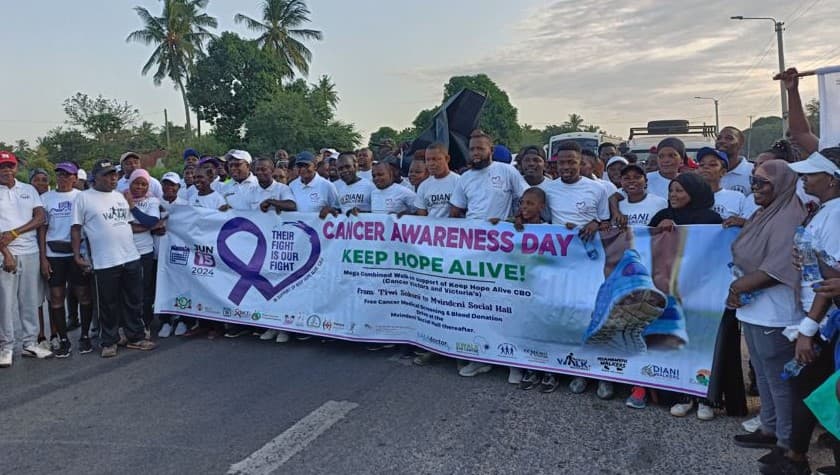We're loading the full news article for you. This includes the article content, images, author information, and related articles.
The government is ramping up efforts to decentralize oncology services and introduce advanced screening technologies, aiming to reduce the nation's growing cancer burden. These initiatives signal a critical shift towards early detection and more accessible care for all Kenyans.

Kenya is escalating its fight against cancer, a disease that claims an estimated 27,000 to 33,000 lives annually, through a series of new, targeted initiatives aimed at bolstering early detection, expanding treatment access, and strengthening the national cancer care infrastructure. These efforts, spearheaded by the Ministry of Health and the National Cancer Institute of Kenya (NCI-Kenya), come as the country grapples with over 44,000 new cancer cases each year, a figure projected to rise significantly by 2040 if current trends continue.
A cornerstone of the renewed strategy is the decentralization of cancer services, historically concentrated in Nairobi. New oncology clinics and centers are being established in counties to bring life-saving care closer to communities. Recent launches include an oncology clinic at Samburu Referral Hospital, the first in the vast pastoral county, and the Mt Elgon Hospital Cancer Centre in Trans Nzoia County. These facilities are expected to drastically reduce the need for patients to undertake long and costly journeys to the capital for treatment.
The government's 2025/26 budget reflects this focus, with significant allocations for cancer management. This includes Ksh1 billion for the construction of a cancer centre at Kisii Level 5 Hospital and an additional Ksh100 million each to enhance cancer treatment at Kenyatta National Hospital (KNH) and Kenyatta University Teaching, Referral, and Research Hospital (KUTRRH). This builds on the 2024/25 budget, which allocated Ksh1.1 billion to improve early diagnosis and management at KNH and the Kisii hospital.
Recognizing that late diagnosis is a primary driver of high mortality rates—with 70-80% of cases detected in advanced stages—Kenya is embracing cutting-edge diagnostic technology. On Monday, October 27, 2025, the Jaramogi Oginga Odinga Teaching and Referral Hospital (JOOTRH) in Kisumu installed an AI-enabled digital mammography system. This advanced 3D imaging technology, the Amulet Sophinity, produces high-resolution images with a low radiation dose, significantly improving the accuracy of breast cancer screening. The Ministry of Health hailed the installation as a "major milestone" in advancing early detection and ensuring equitable access to diagnostic services.
Furthermore, specialized training programs for healthcare workers are being rolled out to enhance their capacity for early detection. In Uasin Gishu County, the Moi Teaching and Referral Hospital has partnered with the county government to launch a training program on Multiple Myeloma, a type of blood cancer, for health workers at all levels. This pilot program is intended to serve as a model for a nationwide rollout under the National Cancer Control Strategy.
Despite these positive developments, significant challenges persist. The high cost of treatment remains a crippling burden for many families, often forcing them into debt. The cost of treating cervical cancer can range from Ksh 690,000 to Ksh 1.5 million, while breast cancer treatment can cost between Ksh 900,000 and Ksh 2.9 million. A severe shortage of radiotherapy machines further complicates the landscape; Kenya has only 19 such machines, far short of the global benchmark of one per million people, requiring an estimated 36 more at a cost of Ksh 90 billion.
The National Cancer Control Strategy 2023-2027 and the National Cancer Policy provide a framework for addressing these issues. The strategy emphasizes prevention, screening, and early detection as the most cost-effective long-term approaches. At the second National Cancer Summit in July 2025, leaders called for a "whole-of-society" approach, urging various government ministries to integrate cancer awareness and prevention into their mandates. This includes integrating cancer education into school curricula and regulating carcinogenic products in agriculture.
The National Cancer Institute of Kenya continues to play a pivotal role in coordinating these efforts, promoting research, and maintaining the national cancer registry. As these new initiatives take root, the focus remains on translating policy into tangible outcomes: reduced mortality, improved quality of life for patients, and a healthcare system better equipped to manage the growing cancer burden across the nation.
Keep the conversation in one place—threads here stay linked to the story and in the forums.
Other hot threads
E-sports and Gaming Community in Kenya
Active 8 months ago
The Role of Technology in Modern Agriculture (AgriTech)
Active 8 months ago
Popular Recreational Activities Across Counties
Active 8 months ago
Investing in Youth Sports Development Programs
Active 8 months ago